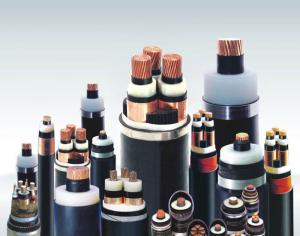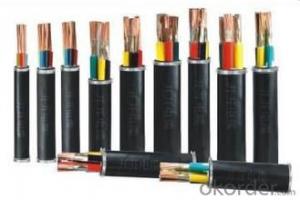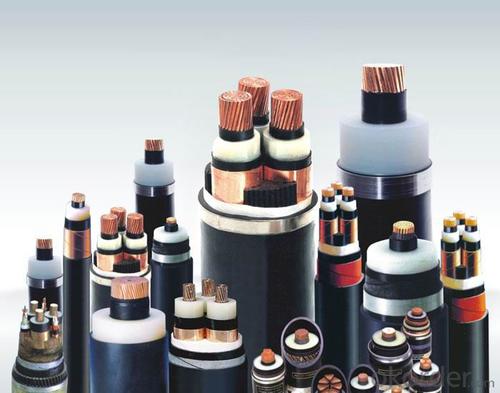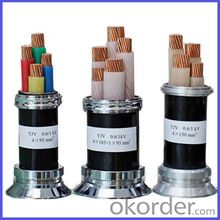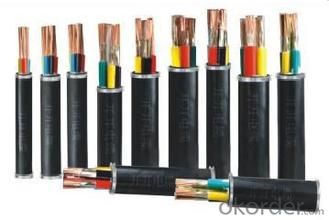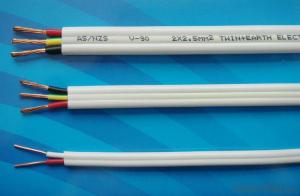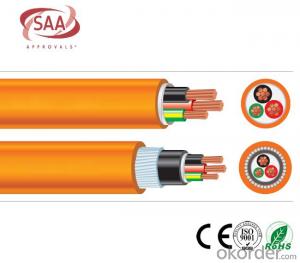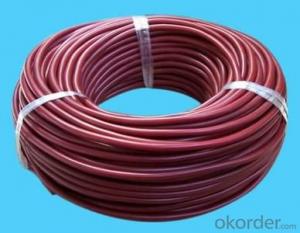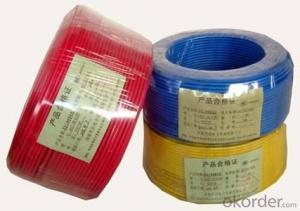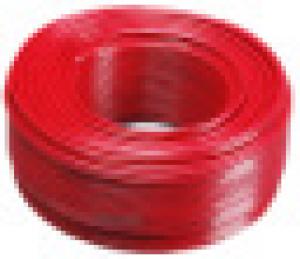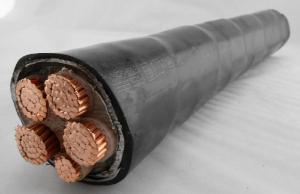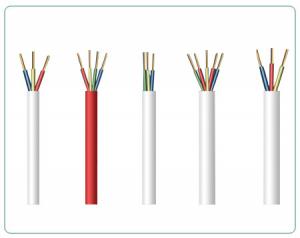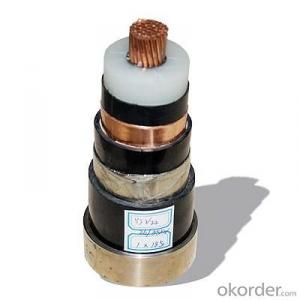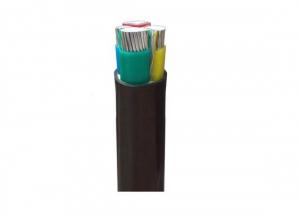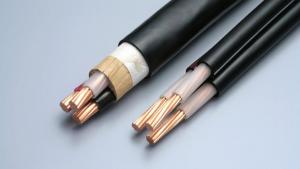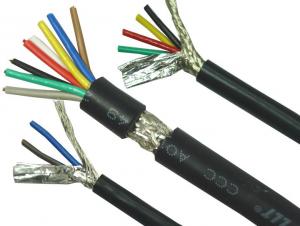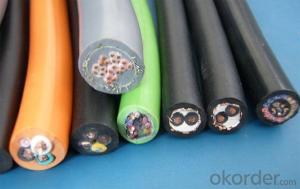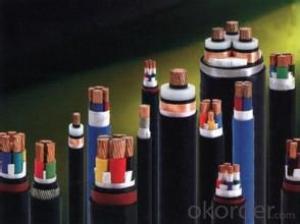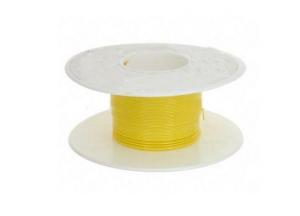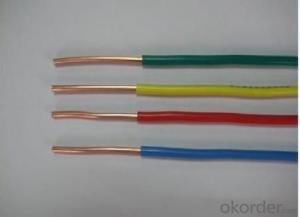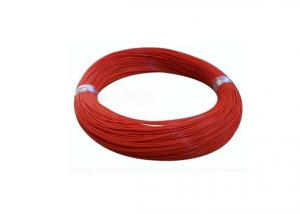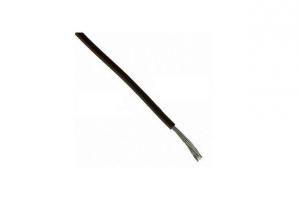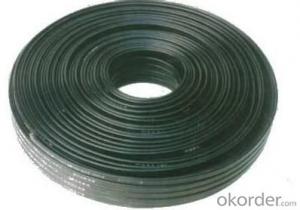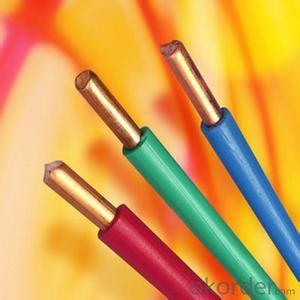Low Voltage Power Cable 240 185 150 120 mm2 PVC XLPE Cable
- Loading Port:
- China main port
- Payment Terms:
- TT or LC
- Min Order Qty:
- 100 m
- Supply Capability:
- 20000 m/month
OKorder Service Pledge
OKorder Financial Service
You Might Also Like
Low Voltage Power Cable 240 185 150 120 mm2 PVC XLPE Cable
Brief Introduction
1.XLPE armored power cable is made complying with the national standed and have pass the CCC - China Compulsory Certification, which contains the recondition of national security certificateC - CEE,imports of safety and quality licensing system - CCIB, China Certification Electromagnetic Compatibility - EMC
2.Range of application : this product is fit A.C rated voltage 0.6/1KV
3 The temperature of the conductor in the working time is no more than 90 centigrade
4.The XLPE cable is mainly used for current transmission,laying in the building, tunnel or directly in the earth, it can afford the outside pressure
5. We can also customize the electrical wire and cable as your requestyou can decide the core count and cross seaction of the conductor, as well as the jacket and insulation
6.The specification YJV
The PVC insulated power cable and fire resistant cable are suitable for fixed laying in power transmission and distribution lines with A. C. 50Hz and voltage rating of up to or including 6KV.
Product Description:
1. Conductors: Copper or aluminum.
2. Both armored and non-armored type power cables are available.
3. Voltage rating: 0.6/1kV 3.6/6kV.
4. PVC or PE sheathed.
5. Number of cable cores: One core (Single core), two cores(Double cores), three cores,
Four cores (Four Equal-section-area cores or three equal-section-area cores and one smaller section area neutral core),
Five cores (Five equal-area cores or three equal-section-area cores and two smaller section area neutral cores).
6. Standards: Chinese national standard GB 12706 and GB 12666.6(equivalent to IEC 60502 and IEC 60331)
IEC, BS, DIN, ASTM, CSA, NFC, AS, GOST etc. Or other special characteristics as customers request.
Application conditions
1. The long-time permissible operation temperature of conductor shall not be higher than 70oC.
2. Conductor maximum short circuit (not more than 5 seconds) temperature shall not be higher than 160 oC.
3. The power cable is not limited by drop in level when being laid, and the ambient temperature shall not be lower than 0 oC.
If so, the cable should to be preheated.
4. Perfect chemical stability, resistant against acids, alkalis, grease and organic solvents, and flame.
5. Light weight, perfect bending properties, installed and maintained easily and conveniently.
Specification
Cu Core | AL Core | Description | Application |
VV | VLV | Cu(Al)Core PVC Insulated PVC Sheathed Power Cable | For laying indoors, in ducts and tunnels, but unable to bear pulling force and pressure |
VY | VLY | Cu(Al)Core PVC Insulated PE Sheathed Power Cable | |
VV22 | VLV22 | Cu(Al)Core PVC Insulated Steel Tape Armored PVC Sheathed Power Cable | For laying indoors, in tunnels and directly in ground, able to bear pulling force and pressure |
VV23 | VLV23 | Cu(Al)Core PVC Insulated Steel Tape Armored PE Sheathed Power Cable | |
VV32 | VLV32 | Cu(Al)Core PVC Insulated Fire Steel Wire Armored PVC Sheathed Power Cable | For laying indoors, in wells and underwater, able to bear certain pulling force |
VV33 | VLV33 | Cu(Al)Core PVC Insulated Fire Steel Wire Armored PE Sheathed Power Cable | |
VV42 | VLV42 | Cu(Al)Core PVC Insulated Thick Steel Wire Armored PVC Sheathed Power Cable | For laying in wells and underwater, able to bear certain axial pressure |
VV43 | VLV43 | Cu(Al)Core PVC Insulated Thick Steel Wire Armored PE Sheathed Power Cable | |
NH-VV | NH-VLV | Cu(Al)Core PVC Insulated PVC Sheathed Fire Resistant Cable | For laying indoors, in ducts and tunnels, but unable to bear pulling force and pressure |
NH-VY | NH-VLY | Cu(Al)Core PVC Insulated PE Sheathed Fire Resistant Cable | |
NH-VV22 | NH-VLV22 | Cu(Al)Core PVC Insulated Steel Tape Armored PVC Sheathed Fire Resistant Cable | For laying indoors, in tunnels and directly in ground, able to bear pulling force and pressure |
NH-VV23 | NH-VLV23 | Cu(Al)Core PVC Insulated Steel Tape Armored PE Sheathed Fire Resistant Cable | |
NH-VV32 | NH-VLV32 | Cu(Al)Core PVC Insulated Fire Steel Wire Armored PVC Sheathed Fire Resistant Cable | For laying indoors, in wells and underwater, able to bear certain pulling force |
NH-VV33 | NH-VLV33 | Cu(Al)Core PVC Insulated Fire Steel Wire Armored PE Sheathed Fire Resistant Cable | |
NH-VV42 | NH-VLV42 | Cu(Al)Core PVC Insulated Thick Steel Wire Armored PVC Sheathed Fire Resistant Cable | For laying in wells and underwater, able to bear certain axial pressure |
NH- VV43 | NH-VLV43 | Cu(Al)Core PVC Insulated Thick Steel Wire Armored PE Sheathed Fire Resistant Cable |
Datas Prameters
1 core
|
1*10; 1*16; 1*25; 1*35; 1*50; 1*70; 1*95; 1*120; 1*150; 1*185; 1*240; 1*300; 1*400
|
2 core
|
2*1.5; 2*2.5; 2*4; 2*6; 2*10; 2*16; 2*25; 2*35; 2*50; 2*70; 2*95; 2*120; 2*150; 2*185; 2*240; 2*300
|
3core
|
3*1.5; 3*2.5; 3*4; 3*6; 3*10; 3*16; 3*25; 3*35; 3*50; 3*70; 3*95; 3*120; 3*150; 3*185; 3*240; 3*300
|
4 core
|
4*4; 4*6; 4*10; 4*16; 4*25; 4*35; 4*50; 4*70; 4*95; 4*120; 4*150; 4*185; 4*240 |
5 core
|
5*1.5; 5*2.5; 5*4; 5*6; 5*10; 5*16; 5*25; 5*35; 5*50; 5*70; 5*95; 5*120; 5*150; 5*185; 5*240; |
3+1 core | 3*4+1*2.5; 3*6+1*4; 3*10+1*6; 3*16+1*10; 3*25+1*16; 3*35+1*16; 3*50+1*25; 3*70+1*35. |
4+1 core | 4*2.5+1*1.5; 4*4+1*2.5; 4*6+1*4; 3*10+1*6; 4*16+1*10; 4*25+1*16; 4*35+1*16; 4*50+1*25; 4*70+1*35; 4*95+1*50; 4*120+1*70; 4*150+1*70; 4*185+1*95; 4*240+1*120; 4*300+1*150. |
- Q: If we are automatons we should be just relying on our instincts and doing the same crap all over again: eat, sex, eat, sex, eat, sex, eat, sex, eat, sex, etc.If we are automatons we can't do these: create science, have money, get puzzled about the structure of the universe, build empires, have a variety of ideologies, wage world wars, have philosophies in life, plot world domination, build amazing structures, foresee the future, watch Youtube, play video games, communicate in the Internet, propose theories, create the theory of relativity, build the Large Hadron Collider, and most of all, HAVE EMOTIONSI'm an atheist, but souls look like more logical
- its eat, sleep, sex. and what says that's not exactly what we're doing? advancing humanity by creating technologies and having intellect as well as instinctual emotions is the perfect thing to make sure a species protects and expands itself.
- Q: I have a 12V electrical device connected with a positive and negative (ground) wire. It is not live. Let's say I connect a second positive cable to the first one. When I turn on the power on the first positive cablee, the device runs fine. What happens if I then also turn on power on the second positive cable? Thanks.
- not enough info. It isn't clear where that second wire is connected. if same source as the first, you really haven't done anything. If it is a different source, how is its return circuit completed? If you wiring is parallel, and both sources are identical but separate, then you basically double the maximum current but do not change the voltage. If you wire in circuit somehow, then you could double the voltage but do nothing to current. Basically, if you wire in a second power source, you increase the power available, and it is a question of whether that power comes from a voltage or current increase.
- Q: Hi I am installing a pool pump. The pool pump requires a 14 awg and a 15 amp breaker. We have the wires and the breaker but a friend says since we are running it about 80 ft away from the pool it will lose power. What should we do?
- Go on up to a number 12 and keep the 15 amp breaker. The footage does not become an issue for another 50 feet so keep with code and return the 14 and don't worry about the breaker you do not want to increase the size just because you increase the size wire. the motor is the load and will be protected just fine with the 15.
- Q: To change the water, and completely worn by the wire problem. I have a little security plot, would like to use the big square of the wire, to the big god to ask ah . the choice of Baosheng multi-strand copper wire line ok? . the home bus 10 square enough? Still bigger? . air conditioning alone, is the Guiji, hang up all the way it? Or Guiji all the way, hang up all the way? Can you use 6 square feet? . socket all the way, is all the bedroom socket are in this way? Is there a 4 square fit? . kitchen, toilet all the way, with 6 square how? Do not understand, big god strange strange. This will not make the wire bad tube? We recommend that you are better than the general situation of some of the insurance to add the problem: the lighting is also a way to all the lights are included in the room? How much more suitable ah more
- Is unified, the line from the PVC pipe first put on, and then open the trench in the wall slotted (at the end of the wall 2MM), wire tube into the box 0.5CM above the steel structure if the words had to trough, Ah
- Q: How do i wire two lights on a 3-way switchi have been messing around with this forever. If you have any web links to diagrams or can word it out that would be greatthanks
- I found the below link by Googling 3-way switch wiring under Images.
- Q: but I don't know the exact name or gauge but it looks like this
- yup thats defo telephone wire
- Q: i had to remove a couple of light fixtures for some drywall repair i was doing. the fixture was hooked up to a hot-neutral aluminum wiring AND a hot neutral copper wire. i think the other fixture had same wiring. have these fixtures been pig tailed? if not, what should it look like? thanx!
- you should NEVER pig tail copper to aluminum ! ! !
- Q: I have a baby monitoring system camera that isn't wireless and I want to make it wireless. It comes with a wire that plugs into an a/c adapter that goes into the wall. The a/c adapter has an input of 120ac and an output of 12dc. I also have a battery holder that holds 8 AA batteries and has two wires coming out of it. I want to cut the wire going to the a/c adapter and hook it up to the wire going to the battery holder. Will this work and how do I hook up the wires?
- The easy answer would be to solder a DC connector identical to the one on the output end of the AC adapter to the two wires coming off the battery holder (red to center pin, black to ring). Here's the not so easy part: What is the current (amperage) required by the camera? The voltage of 8 AA batteries may equal 12VDC, but they probably won't be able to handle the amount of current the camera needs to work. Larger 12VDC batteries might work, but make it less portable, and the operating time might still be limited. Maybe a 12VDC battery from a power back up unit? Is the power cable the only think keeping his camera from being wireless? How does it transmit its signal?
- Q: Ready to buy specifications 1.5 square 4 bundles, 2.5 square 4 bundles, 4 square 2 bundles. What kind of color do you want to buy in general? How much does each color buy? Online look at the general use of blue for the zero line, red for the line of fire, yellow and green for the ground, it is not every specification must have three colors? Such as 1.5 square four bundles of color how to allocate it? The problem is relatively white, trouble everyone to answer in detail, thank you! The The More
- Are you picking up bad? Red and green blue should be the color line If you use the CRT TV to adjust the menu to the AV-2 If you use the LCD TV to adjust the menu to CVI-1 have the image as long as the corresponding color can be connected to the color difference between the two audio and other convenient The words of red and white on the simple that many of your TV should be followed by a red, yellow, white interface, his line with you to see you do not see the same line is the same Color corresponding, corresponding to the menu after adjustment to AV-1
- Q: Why the wire cut there are many ash, and the copper wire is very easy to break
- Do not know what you mean, if only from the literal point of view and understanding, the bridge should be installed in the top of the pipe, the top of the heating tube.
Send your message to us
Low Voltage Power Cable 240 185 150 120 mm2 PVC XLPE Cable
- Loading Port:
- China main port
- Payment Terms:
- TT or LC
- Min Order Qty:
- 100 m
- Supply Capability:
- 20000 m/month
OKorder Service Pledge
OKorder Financial Service
Similar products
Hot products
Hot Searches
